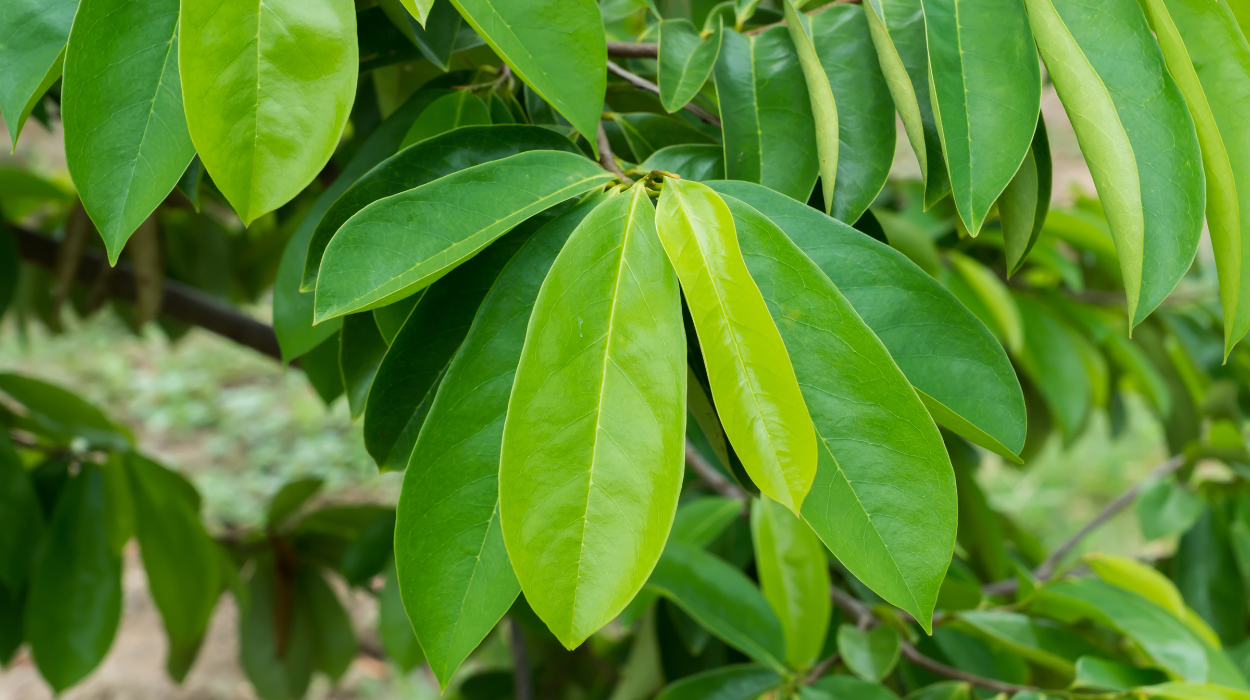Sometimes, certain plants are utilized for medicinal or health-related purposes. One such plant is the soursop plant, whose leaves are believed to have numerous health benefits.
Fortunately, molecular sciences researchers have studied the benefits of this plant to determine whether it has legitimate medicinal properties. Research suggests[1] that this plant might be one of the top fruits for weight loss, among other benefits.
Below, learn all about the benefits of soursop leaves. After learning about the properties of this plant, you may feel compelled to make use of it. It could promote overall health and reduce the risk of chronic diseases.
What Are The Health Benefits Of Soursop Leaves?
Benefits of soursop leaves include:
- Destruction of cancer cells.
- Alleviation of stomach problems.
- Treatment of diarrhea.
- Reduced blood pressure.
- Antidiabetic activity.
- Treatment of illness.
- Healing of wounds.
- Defense against protozoal infections.
- High fiber content.
- Body weight control.
- Reduced cholesterol.
- High nutrient content.
- Hemorrhoid treatment.
- Improved oral health.
- General anti-inflammatory effects.
15 Health Benefits Of Soursop Leaves

Soursop, also known as Graviola, is a fruit found in tropical and subtropical regions. It contains medicinal compounds called phytochemicals,[2] which are believed to have various health benefits. Below are 15 health benefits of soursop leaves.
Some studies may reference guanabana leaves benefits. This term is used interchangeably with soursop and Graviola. If you want to learn about guanabana leaves, you’re in the right place.
Destruction Of Cancer Cells
Soursop leaves contain molecules called acetogenins,[2] which may play a role in cancer treatment. These molecules have been found to reduce the growth of cancer cells, suggesting soursop has anticancer properties.
Research has shown that soursop extracts are cytotoxic against cancer cells,[3] meaning they kill cancer cells. Soursop leaf extract has been found to stop the spread of leukemia[3] cells in human cells in test tube studies. Additional research has shown it can cause cancer cell death[3] in colon cancer, breast cancer, prostate cancer, and lung cancer cells.
Alleviation Of Stomach Problems
Soursop leaves have anti-inflammatory properties, which can benefit gastrointestinal ailments. People commonly use soursop leaves to make tea to treat stomach inflammation and indigestion.[3]
Soursop leaf extract is so strong that it can even treat stomach ulcers.[3] Studies in rats show that soursop leaves contribute to physiological processes that protect the stomach from damage.
Treatment Of Diarrhea
Soursop fruit has been found to have anti-diarrhea properties.[3] It contains chemicals, including antioxidants called flavonoids, that can stop the movement of food through the intestines.
Since soursop leaves have anti-diarrheal effects, people may use them to improve their digestive health.
Reduced Blood Pressure
Soursop leaf extracts are also used to treat high blood pressure. Studies have found that soursop reduces blood pressure in rats.[3]
The extract can block calcium ion channels,[3] which has a blood pressure-lowering effect. Some people may use soursop extract in place of blood pressure medications.
Antidiabetic Activity
Soursop can be used to regulate blood sugar levels. Animal research has shown that ethanol extracts[4] from soursop significantly reduce blood glucose. The effects of soursop leaves on blood glucose are similar to those of antidiabetic medication.
Sometimes, the aqueous extract from soursop is used to lower blood glucose levels.[2] This suggests that this medicinal fruit can be beneficial for preventing chronic diseases like diabetes.
Treatment Of Illness
Other health benefits of soursop are antiviral and antibacterial effects.[3] These effects can extend to a variety of microorganisms.
For example, soursop extracts have been found to attack bacterial membranes,[3] leading to broad-spectrum antibacterial effects. Soursop has also demonstrated antiviral effects[3] against the herpes simplex virus.
Because soursop extract has antiviral and antibacterial effects, people may use it as an herbal remedy for numerous illnesses.
Healing Of Wounds
Soursop ointment[3] is used in alternative medicine to promote wound healing. Soursop has antioxidant effects, which can help wounds heal more quickly.
Defense Against Protozoal Infections
Among its other health benefits, soursop has also demonstrated effectiveness in treating protozoal or parasitic[3] infections. There are limited treatment options for such infections, but soursop extract has demonstrated antiprotozoal effects in numerous studies.
High Fiber Content
Soursop fruit is a good source of dietary fiber. A one-cup serving contains 7.42 grams[5] of fiber. In addition to its numerous health benefits, dietary fiber can regulate appetite.[6] This can make soursop beneficial for reducing sugar cravings and other food cravings.
Body Weight Control
While more research is needed, soursop leaves’ health benefits may include weight control. Animal research[1] has shown that soursop tea can reduce the accumulation of body fat. Therefore, it could be helpful for weight management.
Using soursop as part of a healthy diet could reduce the risk of chronic obesity-related diseases.
Reduced Cholesterol
Graviola leaves benefits can also include improved cardiovascular health, because of this plant’s effects on cholesterol levels. Research with mice has shown that essential oils from soursop leaves can reduce low-density lipoprotein cholesterol[7] levels.
High Nutrient Content
Another one of the many health benefits of soursop leaves is that they have high nutrient content.[8] The leaves are rich in vitamin A, B vitamins, and vitamin C. They are also a good source of potassium, calcium, zinc, phosphorus, and magnesium. Annona muricata L., soursop (graviola)-nature’s gift to mankind with amazing medicinal benefits.[8]
Hemorrhoid Treatment
Researchers have identified soursop as a potential treatment for hemorrhoids. A study with mice found that ethanol extract from soursop[9] leaves reduced inflammation in hemorrhoid tissue.
Ointments made from graviola leaves could be applied to hemorrhoids to provide relief.
Improved Oral Health
Soursop extracts may also fight off oral diseases. One study showed that soursop extract had significant antimicrobial[10] effects against various oral pathogens.
Bioactive compounds in soursop can fight against oral bacteria[10] that cause cavities and other dental problems.
General Anti-Inflammatory Effects
Soursop extracts have anti-inflammatory effects, which can come with several health benefits. One benefit related to soursop’s anti-inflammatory properties[11] is reduced pain.
Research suggests that soursop inhibits the activities[11] of chemicals involved in inflammatory processes. Because of this effect, soursop could be beneficial as a pain reliever.
Other Benefits Of Soursop Leaves
People commonly ask about the 15 health benefits of soursop leaves. These benefits have been described above.
However, there are additional uses for leaves from the soursop tree. For example, people may use soursop leaves to treat fever[12] or other illnesses. It can also be used as a remedy for insomnia and headaches.[3]
Research has also shown that extracts from soursop[13] can enhance the immune system. If you’re interested in the health benefits of soursop, you could use this supplement to promote a healthy immune system. Some people may find that it reduces their chances of becoming sick during cold and flu seasons.
Finally, soursop leaves could be useful for treating autoimmune disorders and inflammatory bowel disease because they contain compounds like flavonoids.[2] However, this medicinal plant should not be used in place of medical treatment for these conditions.
What Are Soursop Leaves?

Soursop leaves[2] come from the soursop tree, which is found in hot environments. Most soursop trees are grown in tropical and subtropical regions.[3] These include South America, Southeast Asia, and the rainforests of Africa.
Soursop trees produce edible fruit, and their leaves are believed to have medicinal properties. Soursop is used in tropical medicine because it contains compounds[3] including acetogenin, alkaloids, and flavonoids. These compounds have antioxidant effects that can provide health benefits.
Are Soursop Leaves Good For You?
Research has suggested that soursop leaves[3] have significant health benefits. Extracts from graviola leaves are used to kill cancer cells, reduce blood glucose levels, and lower blood pressure.
People may use soursop leaves as an alternative to traditional medicine to treat various health conditions. Soursop is used as a natural remedy for health problems, but that doesn’t mean it’s FDA-approved. Much research with soursop has been conducted with rats and mice, so benefits may not apply to humans.
Nonetheless, there is quite a bit of research suggesting that soursop has health benefits. You might consider supplementing with soursop to improve health, but it’s important to consult a doctor before making any changes to your health care plan.
Soursop Leaves Side Effects
Soursop leaves may have anti-inflammatory properties and other health benefits, but that doesn’t mean they are without side effects. Extracts from soursop leaves can cause side effects when consumed in large quantities.
Large doses of soursop leaves can cause hypoglycemia and kidney damage.[3] It’s important to stay within the recommended daily consumption limit to reduce these risks.
Follow the recommendations on manufacturer labels, and remember that the FDA doesn’t approve supplements containing soursop leaves. This means they are not regulated and their safety cannot be guaranteed.
Beyond the risk of low blood pressure, low blood glucose, and kidney damage, extracts from soursop leaves can be toxic to the brain. Consuming too much can cause neurodegenerative problems. These problems have been seen in studies using mice and rats.
In summary, side effects appear with excessive consumption of soursop leaves. To reduce this risk, limit your consumption and take breaks from soursop from time to time. Stop using it if it causes side effects, and talk to a doctor about the safe amount to consume.
Finally, because soursop causes antidiabetic and blood pressure-lowering effects, you shouldn’t consume soursop if you take medication for diabetes or hypertension. It may interact with your medications and cause blood pressure or blood glucose to drop too low.
How To Use Soursop Leaves
Soursop leaves are often used to make tea. You can purchase soursop tea from online retailers and health food stores. Some retailers may market this product as graviola leaves.
Soursop tea bags can be steeped in hot water like any other tea. You can also use whole leaves to make tea. Cut leaves into shreds, put them in a tea ball, and add the ball to a cup of hot water.
In addition to teas, soursop extracts are available as dietary supplements. Some manufacturers produce soursop leaves in capsule form. Others offer liquid extracts from soursop leaves, which are consumed via a dropper.
Retailers that sell fruit and vegetable supplements and green powder may also carry soursop leaves. Some of the best green powders can contain soursop as a main ingredient.
Conclusion
Soursop leaves, which come from a tropical tree, are believed to have numerous health benefits.[3] For example, they have antidiabetic and antioxidant effects. They can also stop the growth of cancerous cells and lower blood pressure.
People may use soursop leaves to reduce inflammation and decrease the risk of chronic diseases. Given the benefits of soursop leaves, some people may use them simply to improve overall health.
Although leaves from soursop trees have numerous potential benefits, they may not be safe to use in large quantities. Talk with your doctor before starting to use soursop leaves or any other herbal medicine.
The bottom line is that animal studies support the use of soursop for improving health. Some people may find that using soursop in moderation alleviates health problems. However, more human research is needed, and Western medicine approaches may be preferred for treating health problems.
Frequently Asked Questions
Soursop tea[3] contains antioxidant compounds with numerous health benefits. Soursop is known to have anti-inflammatory, antiviral, antibacterial, anti-cancer, anti-diabetic, and anti-hypertensive properties.
Talk with a doctor to determine if it’s safe to drink soursop leaf tea daily. Large quantities of soursop leaves can cause side effects, including symptoms of neurodegenerative disease.[3]
Soursop leaves can cause hypoglycemia,[3] so people taking medications for diabetes should not consume soursop. This may cause blood sugar levels to drop too low. The same is true for people taking anti-hypertensive medications since soursop reduces blood pressure.
Soursop leaves are often used in teas to reduce blood pressure. You can buy soursop leaf tea bags to enjoy this benefit. Or, make your tea from whole leaves.
Soursop is rich in antioxidants.[3] When you consume soursop, it has anti-inflammatory effects on the body. It can also benefit the body by reducing blood pressure, cholesterol, and blood glucose.
 Evidence Based
Evidence Based
